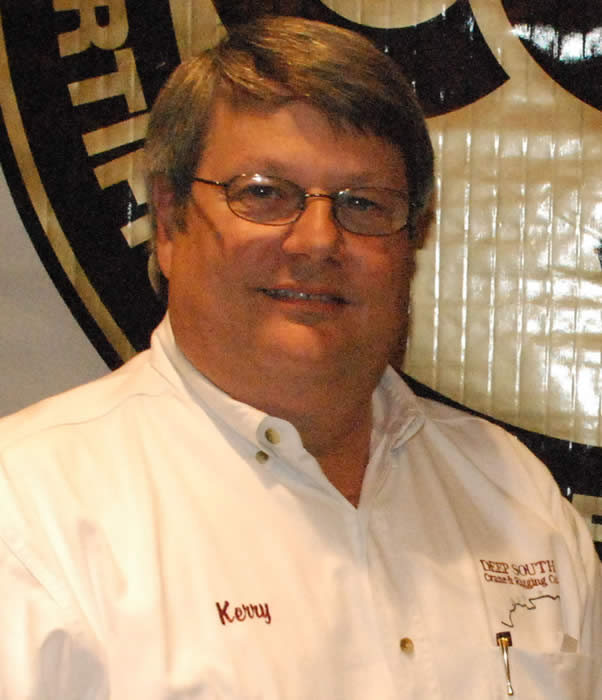April 2008 - Graham Brent, Executive Director, National
Commission for the Certification of Crane Operators (NCCCO) talks with Commission Chairman, Kerry Hulse (pictured below) about development of the new CCO certification programs.
Kerry, why is NCCCO developing these new programs?
The role of the crane operator, and the need for him or her to be qualified, is well understood. The new certifications are geared towards ensuring that crane operators are given safely rigged loads to lift in the first place, along with accurate visible or audible directions on where to place them. It’s a way of “closing the loop” with regard to crane safety on construction sites.

What type of tests will there be?
Both programs will consist of a written and a practical examination. There will also be a recertification requirement. Development is being “double-tracked” to speed things along and provide for optimum synergy between the two Task Forces that have been set up by NCCCO to develop them.
Who is on the Task Forces?
The Task Forces are made up of some 60 volunteers, representing all facets of the industries that use cranes in construction, and all of them are active in their field. Identified as subject matter experts (SMEs), and trained by NCCCO in program development, they have been meeting approximately every six weeks since the Task Forces were established in April 2007.
How have the new programs been developed?
The new programs have drawn on three major resources: industry support, subject matter expertise, and psychometric guidance. All elements of the new programs are being developed according to the strict psychometric standards that are a hallmark of NCCCO’s crane operator programs. In this way we can ensure the tests are fair, valid, reliable, and legally defensible.
Who decides what is tested on the exams?
All the knowledge statements that the Task Forces have selected for the five content domains were identified as being critical to the tasks involved either in rigging or signaling. SMEs in each Task Force have identified the necessary knowledge and skills for each activity, and grouped them into content areas.
What will the tests cover?
For riggers, the tests focus on: the scope of the rigging activity, planning the rigging, selection of rigging components, inspection of rigging, and finally the execution of the rigging activity. For signalpersons the areas are: knowing and understanding hand signals and voice communications, having a basic knowledge of crane operations, understanding specific considerations concerning the construction site (“situational awareness”), and knowing applicable safety standards and regulations.
Who has been providing test-development expertise?
Task Force experts have been guided by psychometric consultants from International Assessment Institute (IAI), the testing services company that has provided exam development and administration services to NCCCO since 1999. As with its existing programs, NCCCO has conducted a professional Job Task Analysis to serve as the foundation for exam development activities.
Will everyone have to be certified?
Although there are currently no state or federal requirements either for riggers or signalpersons to be certified, all construction personnel must be qualified. CCO certification is a federally-recognized means of ensuring this is the case, which is why so many employers, federal agencies, states, labor unions, industry organizations, and insurance firms have come to recognize or require CCO crane operator certification. Also, the Federal Proposed Rule that would revise OSHA’s construction crane standards contains specific qualification requirements for both signalers and riggers. NCCCO’s programs would meet or exceed these requirements.
Will training be required?
Because of the need to provide a completely independent, third-party certification process, NCCCO does not offer training. However, encouraging the use of professionally developed training is one of NCCCO’s primary goals, and we strongly encourage all candidates to enroll in suitable classes before applying to take the exams.
Will the new programs be accredited?
NCCCO will seek accreditation for the new programs once they are completed, just as it has successfully for all three of its crane operator certifications. Accreditation from a national personnel certification accreditation body such as the National Commission for Certifying Agencies (NCCA) or the American National Standards Institute (ANSI) is an indicator of a level of quality that candidates and employers alike have a right to expect from a nationally recognized and administered program.
When will the programs be available?
On current schedule, signalperson certification should be available by mid-2008, followed by rigger certification by year-end. Updates are available from NCCCO’s web site at www.nccco.org as it becomes available.
For those of our readers who are not familiar with NCCCO, could you briefly describe the organization?
The National Commission for the Certification of Crane Operators (NCCCO) is a non-profit industry organization formed in January 1995 to develop effective performance standards for safe crane operation to assist all segments of construction and general industry. Since NCCCO began testing in April 1996, more than 320,000 written and practical exams have been administered to over 60,000 crane operators in all 50 states. Two-thirds of the states that have requirements for crane operators, require or recognize CCO certification.
Who recognizes CCO certification programs?
CCO certification has been nationally accredited by the National Commission for Certifying Agencies (NCCA) since 1998, and by the American National Standards Institute (ANSI) since 2007. The NCCCO crane operator certification program is also the only program to be recognized by federal OSHA as meeting OSHA and ASME (ANSI) requirements for crane operator competency. The program is unique in that it is: third-party; independent of training; developed and supported by industry; a joint labor/management initiative; psychometrically sound; validated through peer review; and administered on a standardized, secure, nationwide basis.
Kerry, thank you for your time. We look forward with anticipation to the introduction of these important new certification programs.